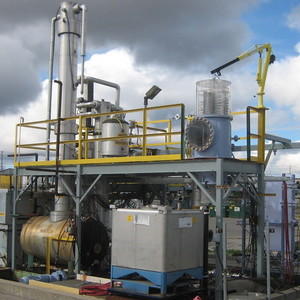Advanced separation technology has application in ethanol

Drystill Holdings Inc.
October 10, 2014
BY Drystill Holdings Inc.
In Canada, the Ontario-based distillation company Drystill recently completed a series of tests on their new pilot plant, including a continuous week-long operation. The pilot plant can separate a variety of feedstocks into products and demonstrates the performance of Drystill’s trademarked thermally integrated evaporation and gas absorption technology platform, and patented stripping absorption module (SAM). The technology has application in manufacturing bio-products like ethanol and in other industries. The system proved to be stable and resilient to variable operating conditions, with results exceeding expectations.
Drystill's pilot plant is among the first in the world to exploit an emerging chemical process technology called Pass-Through-Distillation. The test program was carried out in collaboration with Fielding Chemical Technologies, a leading Canadian solvent-recycling company. The pilot plant is located at Fielding’s site in Mississauga, Ontario. Funding for the project was provided in part by Canada’s Industrial Research Assistance Program.
Advertisement
The hybrid process permits highly efficient and economical, room-temperature distillation. It separates water and other volatiles at temperatures below 86F (30C). This is achieved without expensive equipment, and only using a fraction of the energy compared to prevailing technologies. Furthermore, higher temperatures remain an option. The process works by recycling heat from an intermediate absorption fluid through highly efficient, thermal conductors—called heat pipes—enabling volatiles to be removed from a slurry and transferred into a clean liquid for optimal processing. The SAM is the keystone device—integrating the absorption and evaporation processes into a single unit. Another advantage of this process is the easy removal of the heat pipe bundle from the SAM for cleaning purposes.
Drystill plans to market the technology in industries where process fluids require energy-intensive thermal separation, but are prone to fouling and/or temperature induced degradation. The invention originated when Drystill was challenged by a fuel ethanol industry expert to develop a low-cost process to recover dilute alcohol from a sugary, high-solids fermentation broth. Additionally, the process had to be carried out without denaturing enzymes, killing microbes, fouling heat exchangers, or creating bad smelling compounds resulting from high temperatures.
Advertisement
Drystill sees itself providing a major leap forward in second generation bioethanol processing. According to Ian McGregor, Drystill’s chief technology officer, “Because low-temperature distillation permits ethanol to be removed during fermentation, it opens up new opportunities for improved fermentation and hydrolysis. But on top of that, what we bring to the table is the ability to enable the fermentation broth to benefit from Multiple Effect Distillation, a major energy saver.” Based on its technology platform, Drystill has also developed bolt-on solutions for first generation producers who are looking to transition seamlessly to cellulosic ethanol.
The pilot plant is receiving international attention from various groups and companies. Technical articles are soon to be published. In addition, the company has received support from Ontario Agri-Food Technologies, a non-profit organization comprised of members from grower associations, universities, industry and government. A video about Drystill and its technology can be seen on YouTube.
CEO, Christopher Belchers is ready to move Drystill into its next stage of development: “With the success of our pilot plant, we are currently seeking partnerships within the biofuel industry, and with engineering companies,” he said. “We are expecting to build our first demonstration-scale plant in 2015.”
Related Stories
Saipem has been awarded an EPC contract by Enilive for the expansion of the company’s biorefinery in Porto Marghera, near Venice. The project will boost total nameplate capacity and enable the production of SAF.
Global digital shipbuilder Incat Crowther announced on June 11 the company has been commissioned by Los Angeles operator Catalina Express to design a new low-emission, renewable diesel-powered passenger ferry.
International Air Transport Association has announced the release of the Sustainable Aviation Fuel (SAF) Matchmaker platform, to facilitate SAF procurement between airlines and SAF producers by matching requests for SAF supply with offers.
Alfanar on June 20 officially opened its new office in London, further reaffirming its continued investment in the U.K. The company is developing Lighthouse Green Fuels, a U.K.-based SAF project that is expected to be complete in 2029.
ATR and French SAF aggregator ATOBA Energy on June 19 signed a memorandum of understanding (MOU) to explore ways to facilitate and accelerate sustainable aviation fuel (SAF) adoption for ATR operators.
Upcoming Events










